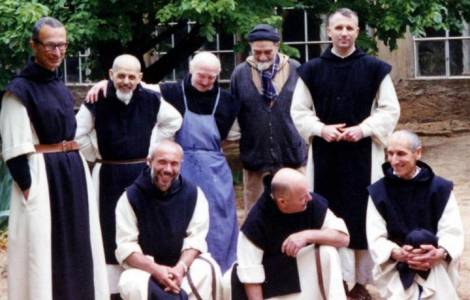
Rome (Agenzia Fides) - Love, humanly impossible, also addressed to one's executioners, is one of the characteristics of Christian martyrdom, which makes it incomparable to all human forms of sacrifice that arise from self-denial for ideological or religious "good causes". Pope Francis repeated this in the brief catechesis that preceded the recitation of the Angelus today, Thursday, December 26, the feast of Saint Stephen, whom the Church celebrates as the "Protomartyr" (first martyr).
The story of the Acts of the Apostles - recalled the Bishop of Rome - presents him to us while, dying, he prays for his killers. And "even though at first sight Stephen seems to be helplessly suffering violence, in reality, as a truly free man, he continues to love even his killers and to offer his life for them, like Jesus; he offers his life so that they may repent and, having been forgiven, be given eternal life." It is precisely by embracing his own executioners with his sacrifice that "the deacon Stephen appears to us as a witness of that God who has one great desire: 'that all men be saved'," the Pope noted, citing the first letter of Saint Paul to Timothy.
The desire of God's heart, the Pontiff insisted, is that no one be lost. Thus, Stephen becomes "witness to the Father - our Father - who wants good and only good for each of His children, and always; the Father who excludes no one, the Father who never tires of seeking them out and of welcoming them back when, after having strayed, they return to Him in repentance and the Father who does not tire of forgiving."
"Even today, those who lose their lives for the Gospel," Pope Francis stressed, referring to the persecutions and martyrs of the present time, "participate in the same miracle of gratuitousness that was manifested in the story of the first martyr, Stephen." They too, like Stephen, "do not allow themselves to be killed out of weakness, nor to defend an ideology, but to make everyone participants in the gift of salvation. And they do so first and foremost for the good of their killers: for the killers … and they pray for them. A beautiful example of this is left to us by Blessed Christian de Chergé, who called his future killer a “last minute friend”," recalled the Supreme Pontiff, evoking the evocative words of the Prior of the Trappist monks martyred in Tibhirine (photo).
After reciting the Angelus, and greeting the “Jewish brothers and sisters throughout the world” who are celebrating the festival of lights, Hanukkah, the Pontiff recalled that the forgiveness of past debts is also part of the tradition and spirit of the Jubilee. He also called for support for the Caritas Internationalis campaign to relieve countries oppressed by unsustainable debts and to promote development. The question of debt, he stressed, “is linked to that of peace and the “black market” of weapons. No more colonizing peoples with weapons! Let us work for disarmament, let us work against hunger, against disease, against child labour. And let us pray, please, for peace throughout the world! Peace in tormented Ukraine, in Gaza, Israel, Myanmar, North Kivu and in so many countries that are at war.”
Earlier in the morning, the Pope had opened the second Holy Door of this Jubilee. He did so in the chapel dedicated to the "Our Father" of Rebibbia prison in Rome, in the presence of about eighty prisoners and Penitentiary Police officers. In the history of ordinary Jubilees, this is the first time that a Holy Door has opened inside a prison, defined by the Pontiff himself as a "cathedral of pain and hope". (GV/FB) (Agenzia Fides, 26/12/2024)